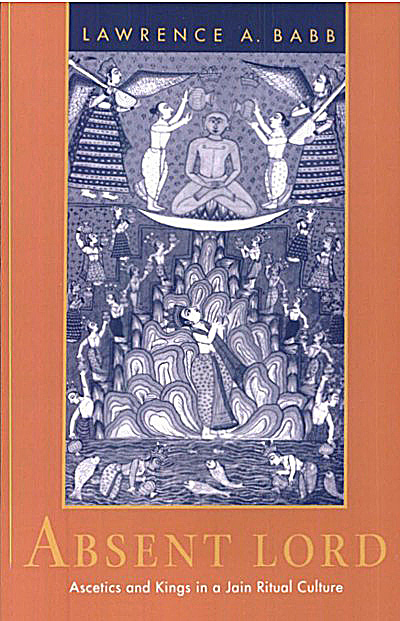All items offered in the Tirthankar's worship instantly acquire a negative ritual status in relation to the givers. This is true of all such rites (including, as we have seen, Parsvanath's five-kalyanak puja), not just the eightfold worship. These items become what Svetambar Jains call devdravya (the Lord's goods), which means that they enter a category of things inviolably earmarked for the Tirthankar (or, by extension, the temple).[1] This does not mean that they are actually possessed by the Tirthankar. My Jain friends stressed, and Jain doctrine unambiguously affirms, that the Tirthankars possess nothing. The most important meaning of the concept of devdravya, rather, is the absolute and unalterable separation between the thing given and the giver or givers. It is a major act of ritual "disrespect" (asatna) for even a single grain of rice offered in puja to pass a Jain's lips. Even if you accidentally have a piece of candy in your pocket during a temple visit, you cannot eat it afterwards. One mendicant author goes so far as to say that, if you take medicine into a temple, it cannot be used afterwards by you (Bhadrabahu Vijay 1989: 56).
Offerings in temple worship are normally deposited in the offering box at the front of the main hall or are otherwise gathered up by the temple's pujaris. The items are generally given to the temple's pujari or pujaris and other servants, and are regarded as payment for services rendered. This practice is probably one of the reasons that pujaris in Svetambar temples are almost always non-Jains.[2] The small sums of money given in agra puja go directly into temple funds. Grains and other materials used in major occasional rites are sometimes given in charity. When this is done, care should be taken to ensure that the recipients are not Jains. It does not matter who in particular receives such materials; the critical thing is that Jains do not.
The nonreciprocity between worshiper and object of worship in Jainism is one of the single most important differences between Jain ritual culture and the ritual cultures of some varieties of Hinduism. The crucial issue is the treatment of food offerings. Among Hindus there is considerable variation in the nature of deity-devotee transactions, a matter to be explored in detail in the final chapter. For the present it will suffice to say that in most Hindu traditions the offering of food to a deity is reciprocated. The food returns from the altar to the donor, and brings with it something of the virtue and power of the deity to whom it was offered. The returned offering is called prasad, a word that has the double meaning of a deity's blessing or grace as well as a reciprocated food offering. From this standpoint, the most salient fact about Jain ritual culture is that there is no prasad.
Why is this so? The answer lies in the inherent nature of an ascetic as an object of worship. As the ultimate ascetic (that is, a fully liberated being), the Tirthankar can neither accept from nor give to a worshiper. He is an object of worship, but he cannot be a transactional alter. When a Hindu recovers offerings from the object of his devotion, the basic idea is that they have been transformed by their divine receiver. But, in the case of the Tirthankar, there is no divine receiver, and therefore the offerings cannot be transformed.
Moreover, the offerings carry an onus of a very special sort. Because the Tirthankar engages in no transactions, the worshiper cannot connect with him. Instead, the only relationship possible is one of emulation. Therefore the food offering is seen through the lens of ascetic values; one cannot become the Tirthankar, but one can become like him. He represents an ideal, fixed in the form of an image before the worshiper's eyes, of a state of existence the worshiper hopes - or is supposed to hope - to attain at some future time. And if worship is emulatory, then the offering is necessarily spiritually insalubrious. To emulate the Tirthankar is, above all, to renounce the world, to get rid of the harmful accretions that weigh down the soul and prevent its liberation. This is precisely how the food offering is interpreted in the eightfold worship. The food offering is not - as we have seen - in any sense "given to" the Tirthankar; it is "given up" in emulation of his giving up of food. To take back what is given up is clearly to undo the good that has been done. Thus, the impossibility of the very idea of prasad.
Spiritually insalubrious to start with, and accepted by no divine receiver, the offering remains in that betwixt-and-between state that Arnold Van Gennep (1960) called "liminal." Given but not taken, in ritual logic the offering hangs suspended, trapped between a giver who cannot take it back and a receiver who is not there. It must therefore be pushed off the edge of the Jain world by being passed to a non-Jain.
Digamber Jains do not use this term; they call leftover offerings nirmalya (see Chapter Five), the consumption of which they likewise forbid. Some Digambars maintain that if, during puja, one accidentally touches the platter into which one is depositing offerings, one should wash one's hands before resuming worship.
A ritually expert friend told me that if the pujari happens to be Jain, then he must be paid out of the temple's general account and not from items offered in puja. It should probably be added that another reason Jains are hardly ever pujari s is simply that few Jains would be willing to engage in such a low-prestige occupation.
 Prof. Dr. Lawrence A. Babb
Prof. Dr. Lawrence A. Babb
